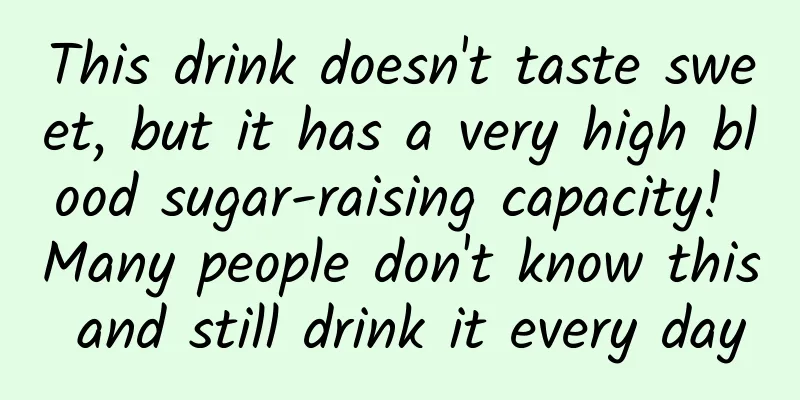This drink doesn't taste sweet, but it has a very high blood sugar-raising capacity! Many people don't know this and still drink it every day

|
Beer, grilled skewers, crayfish, and a few good friends, isn’t this the beauty of a summer night? It feels great, but the speed at which your blood sugar spikes also feels great. Some friends may wonder: I just drank alcohol and ate meat, with some grilled vegetables at most, mostly protein, and I didn't eat any sweets, so why did my blood sugar soar? In fact, the culprit behind this is the beer that is drunk from bottle to bottle (the beer in this article refers specifically to industrial lager, which we commonly call "urine beer"). Although beer itself is not sweet, its mechanism of action in the human body is closely linked to the fluctuation of blood sugar. Today, let's talk about how beer affects blood sugar and what effects this change will have on the body? Copyright images in the gallery. Reprinting and using them may lead to copyright disputes. Why is beer not sweet? Will it also cause blood sugar to spike? At first glance, it seems difficult to associate beer with "raising blood sugar", but many people may not know that beer is also called "liquid bread." The reason why people call beer "liquid bread" is that beer has a great impact on blood sugar. In comparison, the glycemic index of white bread is about 75 (average), the glycemic index of sucrose is 65, and the glycemic index of ordinary beer (such as a certain brand of beer with an alcohol content of 4.5%) is about 119. Even slightly lower ones are around 65-90, which are all high glycemic index foods (a glycemic index of more than 70 is a high glycemic index food). It can be seen that various types of beer are more likely to cause drastic fluctuations in blood sugar after meals than bread and sugar. Some friends may wonder, beer contains no sugar and its carbohydrate content is not high (3-4 grams/100 ml), so why does it cause drastic fluctuations in blood sugar? This is mainly due to the following three reasons: 1. Fast digestion and absorption Like other sugary drinks, beer does not need to be chewed when drinking, and it does not contain protein, dietary fiber, fat and other ingredients that slow down digestion and absorption. Once you drink it, the sugar in it will be absorbed and utilized almost immediately, leading to a rapid increase in blood sugar. 2. It is easy to consume too much in a short period of time When people drink beer, considering the low alcohol content, many people tend to drink several bottles at a time. This can easily lead to the intake of more easily absorbed sugar in a short period of time. 3. Easier to eat more food The drastic fluctuations in blood sugar caused by drinking beer will make people feel hungry quickly, making it easy for them to eat more food, leading to further increases in blood sugar. Copyright images in the gallery. Reprinting and using them may lead to copyright disputes. When a large amount of alcohol is consumed, it may cause a decrease in blood sugar due to the effects of alcohol stimulating insulin secretion and inhibiting the decomposition of liver glycogen. This is not good news for people with diabetes who need to keep their blood sugar levels stable. If hypoglycemia causes dizziness, palpitations, shock and other symptoms, it is quite dangerous. What happens to your body when you drink alcohol for a long time? Many people think that "a little drink can cheer you up", but when drinking, in addition to considering the amount of alcohol we drink, we also need to consider the frequency and duration of drinking. In a word, the harm of long-term drinking to the body can be said to be all-round. 1. It is more likely to cause blood sugar fluctuations As mentioned above, long-term drinking, whether it is beer, white wine or red wine, will cause frequent and relatively drastic fluctuations in blood sugar (blood sugar may increase or decrease), which is very unfriendly to patients with hyperglycemia and diabetes and will accelerate the development of the disease. 2. Increased blood lipids Secondly, the impact of long-term drinking on blood lipids should not be underestimated. Alcohol is called "empty energy food", which means that in addition to providing energy, it does not provide other nutrients such as protein, vitamins, minerals, dietary fiber, carbohydrates and fat. Drinking is equivalent to taking in more energy than the normal energy intake from eating. Considering that people tend to eat a lot when drinking, and the side dishes are relatively greasy and high in calories, the overall calorie intake is greatly increased. These excess calories will be converted into fat and stored in the body, causing increased blood lipids and endangering cardiovascular and cerebrovascular health. 3. Damage to the liver It is an indisputable fact that drinking alcohol damages the liver. This is not only because alcohol needs to be metabolized and detoxified by the liver, which increases the liver's workload; it is also because excessive alcohol intake, when converted into fat, will promote the development of fatty liver. Moreover, after suffering from fatty liver, if you continue to drink large amounts of alcohol for a long time, it will cause acute damage to the liver and increase the risk of fatty liver developing into cirrhosis and liver cancer. 4. Damage to the stomach Long-term drinking can damage the stomach. Alcohol entering the gastrointestinal tract can directly cause damage to the gastric mucosa, causing congestion and edema of the gastric mucosa, which in turn leads to gastrointestinal dysfunction, gastritis, and an increased risk of gastric cancer. I don't know if you have noticed that some people eat less or even no staple food and vegetables when drinking, because alcohol provides too much energy. However, not eating staple food when drinking also happens to lose the protective effect of cereal staple food on the gastric mucosa, making drinking more harmful to the gastrointestinal tract. 5. Affects the health of the brain and nervous system Some people say that drinking alcohol all the time will make you stupid. There is solid evidence that alcohol harms the brain and nervous system. Long-term drinking can significantly reduce a person's learning ability and memory, and also affect concentration and self-control. Studies have shown that drinking alcohol can lead to a reduction in the overall brain volume of people, and the more alcohol you drink, the more serious this effect is, which means that long-term drinking can lead to organic brain lesions. Drinking just two cans of beer a day can lead to brain aging. Copyright images in the gallery. Reprinting and using them may lead to copyright disputes. Some friends may argue, "I think there's nothing wrong with xx drinking for many years." The logical fallacy behind this view must be understood by everyone: whether a person is sick or not is related to many factors. In addition to drinking, it is also affected by whether there are good eating and exercise habits, whether the work and rest are regular, mental health, work pressure, the hygiene of the living environment, etc. And more importantly, genetic genes will affect a person's illness. But on the other hand, no matter how the above factors work, the many health hazards of long-term drinking are certain to exist. How to reduce the harm of drinking? First of all, we must emphasize that we do not advocate drinking. However, if you encounter some situations in life and work where you must drink, you can try the following tips to help you appropriately reduce the harm caused by drinking. Eat staple food before drinking, and give priority to coarse grains Eating some cereal staple foods properly can not only protect the gastric mucosa, but also the B vitamins in the cereals can make up for the large amount of vitamin B1 consumed in the alcohol metabolism process. Considering that coarse grains are richer in B vitamins, coarse grain staple foods are recommended first, such as red bean brown rice, oats, rice, millet rice, etc. Drink slowly and take small sips, and eat more fresh fruits and vegetables between drinks Drinking slowly and in small sips can reduce the harm to the liver and other organs when a large amount of alcohol enters the body quickly. If you can eat more fresh fruits and vegetables while drinking, the water and vitamins they provide can also promote alcohol metabolism and protect the liver. Drink plenty of water while drinking to promote alcohol excretion You must drink water frequently and urinate more often while drinking, preferably warm water, lemon water, and light tea. Timely intake of these waters can promote the excretion of alcohol from the body. References [1]Atkinson FS, Brand-Miller JC, Foster-Powell K, et al. International tables of glycemic index and glycemic load values 2021: a systematic review[J]. The American journal of clinical nutrition, 2021, 114(5): 1625-1632. [2]Daviet, R., Aydogan, G., Jagannathan, K. et al. Associations between alcohol consumption and gray and white matter volumes in the UK Biobank. Nat Commun,2022,13, 1175. Author: Wang Lu, registered dietitian Review丨Zhang Yu, researcher/PhD, Chinese Center for Disease Control and Prevention, national health science expert |
<<: Rags and sweaters alert! Are humans powerless against moths that eat sweaters?
Recommend
A new version of WeChat is here: This place has been deleted
Recently, Tencent officially launched WeChat vers...
Ford subsidiary Autonomic and Alibaba Cloud sign a memorandum of understanding to launch TMC in China to optimize consumer mobility experience
Shanghai, China, August 14, 2018 – Autonomic, a s...
If you press and hold WeChat for 2 seconds, so many hidden functions will appear. How many of them have you used?
WeChat is one of the most familiar mobile apps in...
A man was scared when 2 liters of oil were drawn from his blood during a physical examination
Recently, Mr. Wang from Hankou had a very profoun...
Android 6.0 devices are required to enable full disk encryption
The last thing everyone wants to see has happened...
Retention rate? Several classic methods to keep more users!
An APP and its users will go through four stages:...
Understand how Baidu did promotion in the early days in five minutes!
First, let me answer the question of “killer prom...
How to create a CocoaPods in Swift
You may be familiar with some well-known open sou...
The billion dollars Lei Jun gave to Chen Tong might go to Baidu?
Frankly speaking, the news that Lao Chen was goin...
OPPO App Market Information Flow Optimization Methods and Techniques
1. New promotion Path: Promotion – Information fl...
The most beautiful flavor in the world is the repeated confrontation and mutual creation between the ocean and the land.
Written by Wei Shuihua Header Image | A Flavour o...
Chen Yifeng's "Practical Textbook on Finding Dragon Points" A set of 8 pdf books on Finding Dragon Points can be downloaded from Baidu Cloud!
Chen Yifeng's "Practical Textbook on Fin...
Sony curved CMOS sensor photo samples leaked
Sony released a curved CMOS sample a month ago, wh...
World Migratory Bird Day | Rare than the giant panda? How much do you know about this "world's most mysterious bird"?
May 13 is the first World Migratory Bird Day in 2...
How much does it cost to join the Tongliao skin care products mini program?
How much does it cost to join a skin care product...









